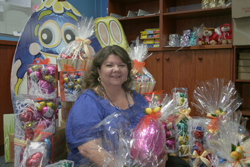
THE majority of the chocolate used in the eggs on sale this Easter has been produced by children who have been trafficked or forced into slave like working conditions in cocoa plantations across West Africa.
According to World Vision Australia, 70% of the cocoa beans used to make the world’s chocolate comes from West Africa.
Large chocolate companies such as Nestlé, Cadbury and Ferrero have admitted that there are ethical issues surrounding the chocolate industry but most haven’t demonstrated a serious commitment to bringing about social change.
South East Uniting Community minister, Rev Yvonne McRostie, is very cautious when buying products and now ensures all her purchases are Fairtrade.
When buying eggs this Easter Ms McRostie recommends Chocolatier and Cadbury’s Easter Magic hollow egg.
“This year I will be purchasing Cadbury dairy milk chocolate bars (which are Fairtrade) and melting them into Easter egg moulds,” she said.
Ms McRostie encouraged people who want to make a difference and are passionate about social justice issues to write to chocolate companies to push for their products to be ethically and sustainably produced.
“I’m beginning to see that following Jesus is not always about my personal comfort, it’s sometimes about my discomfort at allowing others to suff er for my pleasure.
“I believe when we connect with people and really hear their stories of suffering, we hear the message of the gospel and we trust in the Holy Spirit – transformation and a change of heart will follow,” said Ms McRostie.
Easterfest Chaplaincy Coordinator, Leanne Hutton, agreed.
“We get Easter eggs every year so that chaplains are able to hand them out on Easter morning to the crew,” she said.
“I checked the link on JourneyOnline which had a list of chocolate companies and whether or not they were Fairtrade.
“This year we got our Easter eggs from Darrel Lea who are Fairtrade because we don’t want any gift that we give to our crew, in celebrating Jesus’ death, to come on the back of someone else’s pain,” she said.
Ms Hutton said she would rather have fewer eggs that were Fairtrade than have a larger quantity of eggs and subsequently support human trafficking within the cocoa industry.
“We had an option of 1000 Fairtrade eggs from Darrel Lea at one price or I could have bought 2000 eggs from another company which weren’t Fairtrade for $30 less, but at what cost?” asked Ms Hutton.
Trinity Wilston Uniting Church minister, Rev Sue Pickering, began purchasing Fairtrade products in the early 1990s.
“It doesn’t take long or much research to realise that the poor are being exploited and we began purchasing Fairtrade tea, coffee, chocolate and clothing where possible,” she said.
“It may mean forfeiting favourites or paying a little more, but it comes down to what we want to support: justice or injustice.”
As a Christian Ms Pickering feels that it is even more important to consider the ethics of consumerism.
“I believe that our faith is not simply about believing in Christ but also about action.
For me it is about a way of life.
“The exploitation of children and the poor on the Cote d’Ivoire plantations will continue while there is a demand for chocolate without a demand for justice.
“As consumers we can bring about change.
What is more important: the luxury of having cheap chocolate or taking a stand against abuse, exploitation and injustice?” she asked.
Ms Pickering encouraged Christians to take a stand against human trafficking this Easter.
“I believe we have a responsibility to campaign against the abuse and exploitation of the poor and vulnerable, to call for fair pay or at least safe working conditions.
“We have a voice and I feel that our call to faith is also a call to be a voice for the voiceless and to be the light in the dark places.”
When shopping for Easter eggs Ms Pickering recommends Oxfam chocolates, as well as Aldi which sells a Fairtrade brand.
Coles stocks Cocolo and Woolworths stocks Green and Blacks among other Fairtrade brands.
She has found an app that helps her know if what she is purchasing is ethically made.
“The Ethical Shopper app is a great way to begin thinking about the ethics of what we purchase.
“The contemporary slave trade is alive and possibly even more insidious than ever before and I think we need to begin to accept that in many ways we are part of the problem.”
To find Fairtrade chocolate download the Good Chocolate Guide from www.worldvision.com.au
Photo : In her element: Easterfest Chaplaincy Coordinator, Leanne Hutton, enjoys picking up FLO-CERT certified Fairtrade Easter eggs from Darrel Lea. Photo by Holly Jewel.
 JourneyOnline
JourneyOnline






